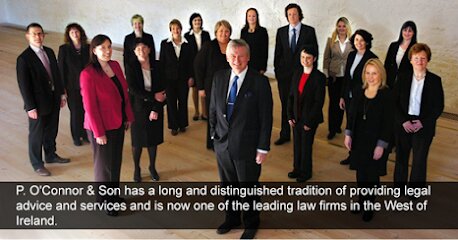Best Defamation Lawyers in Dublin
Share your needs with us, get contacted by law firms.
Free. Takes 2 min.
List of the best lawyers in Dublin, Ireland
About Defamation Law in Dublin, Ireland
Defamation in Dublin, Ireland, falls under a general category of civil wrongs known as torts. Defamation is defined as a false statement presented as a fact that causes injury or damage to the character of the person being spoken about. There are two primary types of defamation: libel (written defamation) and slander (spoken defamation). The Defamation Act 2009 is the principal legislation governing defamation law in Ireland, providing a legal framework for addressing and resolving defamation disputes.
Why You May Need a Lawyer
Defamation cases can be complex and often require specialized legal knowledge. Common situations where individuals may need legal advice include:
- If someone has made false and damaging statements about you or your business.
- If you have been accused of making defamatory statements and need to defend yourself.
- If you need to understand your rights and the potential legal remedies available to you.
- If you require assistance in drafting retractions or negotiating settlements.
Having a lawyer can help navigate the legal intricacies, gather necessary evidence, and represent your interests effectively.
Local Laws Overview
Key aspects of defamation laws in Dublin, Ireland, include:
- The Defamation Act 2009: This act outlines what constitutes defamation, the defenses available, and the remedies a court may provide, including damages and corrective measures.
- Burden of Proof: The plaintiff must prove that the statement was defamatory, false, and caused harm to their reputation.
- Defenses: Common defenses against defamation claims include truth (justification), absolute and qualified privilege, honest opinion, and fair and reasonable publication on matters of public interest.
- Publication: Importantly, the defamatory statement must have been published to at least one person other than the plaintiff.
Frequently Asked Questions
What constitutes a defamatory statement?
A defamatory statement is one that is false and harms the reputation of an individual or entity by causing others to think less of them.
What is the difference between libel and slander?
Libel refers to written or published defamatory statements, while slander pertains to spoken defamatory statements.
Is truth a defense to defamation?
Yes, truth is a complete defense to a claim of defamation. If the statement made is true, then it is not considered defamatory.
What should I do if I am accused of defamation?
If you are accused of defamation, it is advisable to seek legal advice immediately. A lawyer can help you understand the allegations and formulate a defense.
How can I prove that I have been defamed?
To prove defamation, you need to show that the statement was false, defamatory, referred to you, and was published to a third party.
What damages can be awarded in defamation cases?
Damages can include compensation for harm to reputation, distress, and any financial losses incurred due to the defamatory statement.
Can a defamation case be settled out of court?
Yes, many defamation cases are settled out of court through negotiations, mediation, or retractions and apologies from the defendant.
What is the statute of limitations for defamation cases in Ireland?
The statute of limitations for defamation cases in Ireland is one year from the date of publication of the defamatory statement.
Can opinions be considered defamatory?
Opinions may be considered defamatory if they imply false statements of fact. Pure opinions that do not allege facts are generally not defamatory.
Can I be sued for defamation for something I posted online?
Yes, online publications, including social media posts, can be subject to defamation claims. If a statement published online is false and damaging, it can lead to legal action.
Additional Resources
For more information or support regarding defamation in Dublin, Ireland, consider the following resources:
- The Law Society of Ireland
- Citizens Information Board
- Press Council of Ireland
- Defamation Act 2009 (accessible through the Department of Justice)
Next Steps
If you believe you need legal assistance in a defamation matter, consider taking the following steps:
- Document the defamatory statements and gather any evidence, including publications, communications, and records of harm or damages incurred.
- Consult with an experienced defamation lawyer to discuss your case and understand your legal options.
- Consider whether you want to pursue legal action or seek alternative resolutions such as retractions or apologies.
- Follow your lawyer's advice regarding any communications or actions to avoid compromising your case.
- Stay informed about the progress of your case and participate actively in any legal proceedings.
Seeking professional legal assistance ensures that you receive qualified advice and representation to protect your rights and interests in defamation cases.
Lawzana helps you find the best lawyers and law firms in Dublin through a curated and pre-screened list of qualified legal professionals. Our platform offers rankings and detailed profiles of attorneys and law firms, allowing you to compare based on practice areas, including Defamation, experience, and client feedback.
Each profile includes a description of the firm's areas of practice, client reviews, team members and partners, year of establishment, spoken languages, office locations, contact information, social media presence, and any published articles or resources. Most firms on our platform speak English and are experienced in both local and international legal matters.
Get a quote from top-rated law firms in Dublin, Ireland — quickly, securely, and without unnecessary hassle.
Disclaimer:
The information provided on this page is for general informational purposes only and does not constitute legal advice. While we strive to ensure the accuracy and relevance of the content, legal information may change over time, and interpretations of the law can vary. You should always consult with a qualified legal professional for advice specific to your situation.
We disclaim all liability for actions taken or not taken based on the content of this page. If you believe any information is incorrect or outdated, please contact us, and we will review and update it where appropriate.














